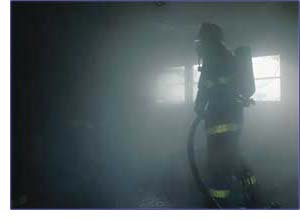Owners of a business gutted by fire learn the importance of two little words in their lease contract.
 A firefighter in smoke
A firefighter in smoke
A good example of the importance of proper contract writing and interpretation can be found in the case of Gym-N-I Playgrounds v. Ron Snider [158 S.W.3d 78 (2005)]. Ron Snider originally owned both Gym-N-I, a playground equipment manufacturing company, and the building in which Gym-N-I was located. The 20,075-square-foot building was slightly larger than the size threshold established for the fire-sprinkler requirement under the New Braunfels, Texas, Code of Ordinances. However, the fire marshal only recommended that Snider install a sprinkler system; he did not require it, since the building was only 75 square feet over the square-footage threshold. After considering installing a sprinkler system and obtaining bids, Snider ultimately chose not to install a system in the building.
In 1993, Patrick Finn and Bonnie Caddell, who had both worked various jobs for Snider in the building for several years, bought the Gym-N-I business from Snider. Finn and Caddell also entered into a commercial lease of the building with Snider. The lease contained the following clause:
Tenant [Gym-N-I] accepts the Premises AS IS. Landlord [Snider] has not made and does not make any representations as to the commercial suitability, physical condition, layout, footage, expenses, operation or any other matter affecting or relating to the premises and this agreement, except as herein specifically set forth or referred to and Tenant hereby expressly acknowledges that no such representations have been made. Landlord makes no other warranties, express or implied, of merchantability, marketability, fitness or suitability.
On Jan. 31, 1995, Gym-N-I and Snider executed an amendment to the lease. The amendment provided that, upon 90-day advance written notice, Gym-N-I would have the option of renewing the lease for three two-year terms. The amendment further provided that, except for rent, the terms and conditions of the original lease would apply to the renewal term.
The original lease expired on Sept. 30, 1996, without Gym-N-I having exercised the renewal option. However, for nearly the next four years Gym-N-I continued to pay, and Snider continued to accept, rent each month. Other than the unexercised renewal option, the sole written instrument in the record contemplating a continuation of the original lease was a holdover clause.
On Aug. 10, 2000, a fire completely destroyed the building and its contents. In an attempt to recover financial compensation for their lost and damaged property, Gym-N-I sued Snider, asserting claims of negligence, fraud under the Deceptive Trade Practices Act (DTPA), and breach of the implied warranty of suitability. Specifically, Gym-N-I argued that Snider's failure to install a sprinkler system as required by the Code of Ordinances constituted gross negligence and negligence per se, and that leasing the premises in such a condition violated the DTPA and breached the implied warranty of suitability.
Snider countered by asserting that all of Gym-N-I's claims were barred by the "as is" clause contained in the contract. Snider further argued that the lease contained other valid waivers of express and implied warranties.
The district court ruled in favor of Snider, and Gym-N-I appealed to the Third District Court of Appeals of Texas. On appeal, Gym-N-I raised two issues. First, it claimed that the "as is" clause did not carry over into the holdover period of the original lease. Second, Gym-N-I argued that even if the clause did carry over into the holdover period, the "as is" clause was unenforceable.
Reviewing the language of the original lease, the Court of Appeals examined closely the holdover provision, which stated that "any holding over without written consent of Landlord shall constitute a lease from month-to-month, under the terms and provisions of this lease to the extent applicable to a tenancy from month-to-month." The court found that the parties clearly intended to create a month-to-month tenancy at the expiration of the lease and to include all the terms of the original lease not directly related to the duration and price of the original lease. Accordingly, the court held that the "as is" clause from the original lease was incorporated into the holdover lease and was applicable at the time of the fire. To do otherwise, the Court of Appeals ruled, would be to give the phrase "under the terms and conditions of this lease" no meaning or effect.
The court next examined Gym-N-I's second argument, that the "as is" clause was unenforceable. Before determining whether the clause was enforceable, however, the court outlined the legal effect such a clause would have on a contract. In particular, the court found that when an "as is" clause is used in a contract, the buyer agrees to make his or her own appraisal of the bargain and accepts the risks of the agreement. Therefore, as long as the buyer is not induced by fraud into accepting the "as is" provision, the legal effect of the provision is to negate the causation element essential to recovery on claims associated with the physical condition of the property. In addition, the court also stated that when used, an "as is" agreement negates the causation element essential to recovery on DTPA theories, as well as on the theories of fraud, negligence, and breach of the duty of good faith and fair dealing.
When considering the enforceability of an "as is" clause, the court identified five factors that must be met in order for the clause to be held valid:
- the sophistication of the parties
- the terms of the agreement
- whether the agreement was freely negotiated
- whether the agreement was an arm's-length transaction (that is, between parties deemed to be on an even footing)
- whether there was a knowing misrepresentation or concealment of a known fact. (Additionally, the court found that while not an independent factor, whether the buyer was represented by counsel is also important.)
Applying the five factors to the current case, the court held that it was undisputed that Snider had met the five factors and that the clause was valid. In particular, the court stressed that both Finn and Caddell were familiar with the building space they were leasing and with the needs of their business. In addition, the court found that Finn had been present when the fire marshal discussed the installation of a sprinkler system with Snider, and that both Finn and Caddell knew that Snider had received bids for sprinkler systems but had ultimately decided not to install one. The court also noted that both Finn and Caddell acknowledged that Snider did not commit knowing misrepresentation, concealment or fraud. In fact, the court noted that the "as is" provision was even underlined and set in all capitals for emphasis. Finally, the court noted that both Finn and Caddell realized the "as is" provision was in the lease, were represented by counsel when they signed the lease, were told by counsel that the provision highly favored Snider, and understood the provision's intent and scope.
Therefore, since all of Gym-N-I's claims focused on circumstances related to the physical condition of the property before the lease was signed, the Court of Appeals held that the "as is" provision negated causation in each of the claims asserted against Snider by Gym-N-I. Put another way, the Court of Appeals found that Gym-N-I's agreement to accept the premises "as is" effectively superseded any fault of Snider's.
While not breaking any new legal ground, the Appellate Court's decision in Gym-N-I Playgrounds v. Snider does provide sport and recreation managers with a valuable lesson. As the court's decision demonstrates, even the smallest words can change the terms of a contract and be the difference between a successful business and one in bankruptcy. Therefore, it is recommended that sports and recreation managers hire a competent attorney to write and interpret all contracts. In addition, it is also important that sports and recreation managers get their attorney to outline the worst possible scenarios of the contract. For example, in this case, Gym-N-I should have been told what would happen if there was a fire and who would be responsible. Only with complete information can sports and recreation managers make the informed decisions necessary to successfully run their businesses.




































